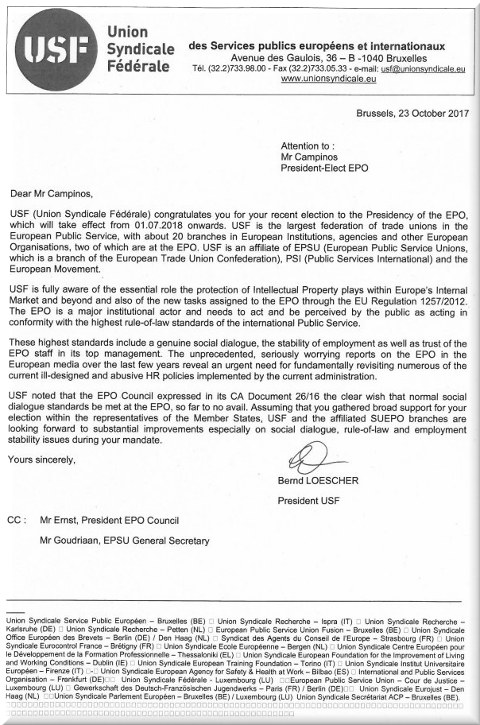

THE subject many people speak of at the EPO this week is censorship. Freedom of expression is a pretty fundamental right.
"The censorship was deliberate and not a technical error."SUEPO has just published the above letter from USF, which long ago started observing the abuses at the EPO. The corresponding page is in French and the image was published in PDF form by SUEPO. We are keeping a copy of it just in case.
"This latest commentary from IP Kat merely helps show (or reinforce the perception) that EPO controls the media."As a reminder to our readers, the EPO has already threatened publishers, blogs, politicians and much more. Even SUEPO's Web site got censored (using threats). That was 2 years ago; it may have happened again since then. The EPO is a lunatic bully, a perfect embodiment of its "king", so insecure with inferiority complex.
Yesterday, someone wrote to a brave blogger (who did not hide behind a pseudonym like IP Kat bloggers): "Thorsten, it is indeed still possible that there is an “innocent” explanation. However, let me say that it is becoming increasingly hard to believe in such a version of events. I mean, are we to understand that it is merely coincidence that “technical” problems only affect one post, which post just happens to be on a topic previously affected by a moratorium on reporting?"
This was said in relation to censorship at IP Kat -- a subject we wrote a number of posts about earlier this week. It turns out that we were right. At around 10AM today "Merpel" (whoever uses that name right now) admitted that this was not an accident. The censorship was deliberate and not a technical error. Here is how this was justified: "On all posts relating to the European Patent Office, however, the right to post pseudonymously has been abused in recent times. On Merpel's post welcoming the new president of the EPO, the situation got out of hand. The overwhelming majority of comments were purely libellous ad hominem attacks on a man that has not even taken office. This led the IPKat team to decide to remove all comments on said post (IPKat did not receive any legal threats)."
By admitting that the blog did not receive legal threats (which the EPO does issue sometimes) it basically says that its censorship wasn't the fault of EPO management. When "Merpel" uses the words "purely libellous ad hominem attacks" it basically uses the same vague accusations made by EPO management (they censor Techrights using such vague accusations, without even providing a single example of libel).
"The technical issues aside, there are many human rights issues. Why does the media barely cover these?"All sorts of politicians and horrible people have negative things written about them. A functioning society needs that. Would IP Kat deem that too "libellous ad hominem attacks"? Can IP Kat not see that what goes on at the EPO merits harsh words?
This latest commentary from IP Kat merely helps show (or reinforce the perception) that EPO controls the media. Watch how effective it really is. Remember that IP Kat used to harshly criticise the EPO until the EPO blocked the blog (for a day); that's when self-censorship started.
The EPO is a truly authoritarian regime whose very existence at the heart of Europe harms everything around it. It poisons the media, too.
"That's classic self-censorship and they publicly admitted it.""Presumably," said this comment earlier today, "the EPO's current obsession with assignments requiring proof of the right of the signatory to bind the relevant party will also be applied to assignments of priority."
The technical issues aside, there are many human rights issues. Why does the media barely cover these?
Earlier on Mark Schweizer from IP Kat wrote about the EPO. But nowadays when the blog IP Kat writes about the EPO’s Board of Appeal it's about a ruling; it has said nothing about its exile to Haar (weeks ago). Here is what Schweizer wrote:
This is quite important - the EPC’s substantive requirements for a valid transfer, namely that the right of priority as such be assigned, cannot be circumvented by the argument that the applicable national does not foresee an independent priority right. Whether this is correct is certainly open to question.
In sum, T 1201/14 provides an excellent summary of the EPO’s case law on the transfer of priority rights, but does not clarify which national law applies to the transfer of the priority right. It should make practitioners acutely aware that the EPC, despite appearances to the contrary, does contain substantive requirements for the transfer which apply irrespective of the applicable national law.
Comments
john
2017-10-26 07:44:52